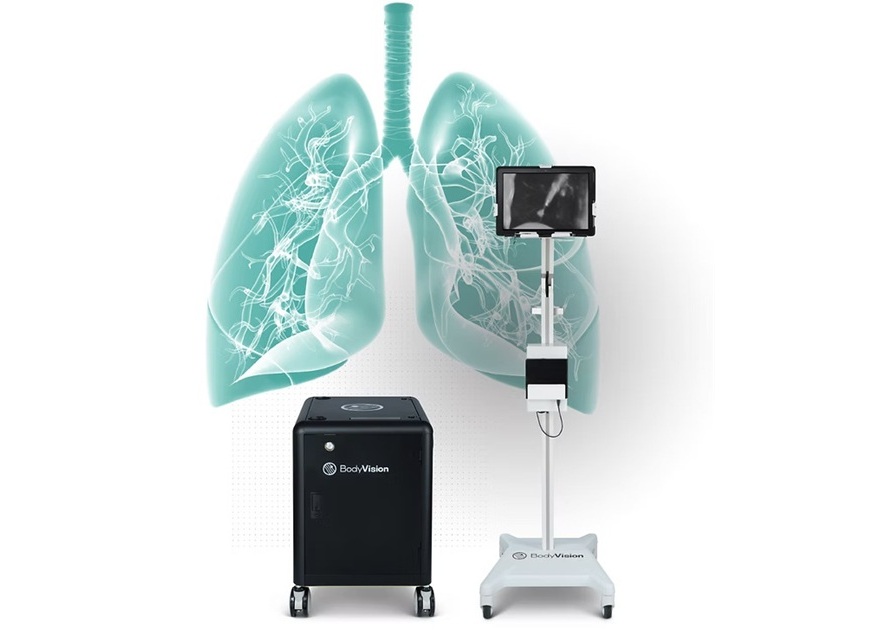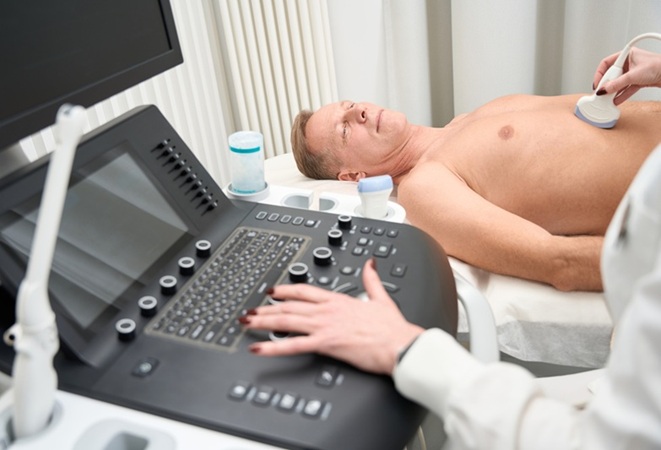Single Chest X-Ray Predicts Mortality Risk
|
By MedImaging International staff writers Posted on 08 Aug 2019 |
A new study suggests that a convolutional neural network (CNN) can stratify all-cause mortality risk based on a single chest radiograph.
Developed at Massachusetts General Hospital (MGH; Boston, USA), Harvard Medical School (HMS; Boston, MA, USA), and other institutions, the CNN algorithm, named CXR-risk, uses data from radiologists' diagnostic findings (such as presence of a lung nodule) on a chest x-ray, and combines it with other risk factors, including age, sex and comorbidities in order to predict long-term mortality, including non-cancer death. A deep learning CXR-risk score (very low, low, moderate, high, and very high) is generated based on CNN analysis of a submitted radiograph.
To develop the CNN, the researchers used 41,856 x-rays from the screening radiography arm of the Prostate, Lung, Colorectal, and Ovarian (PLCO) cancer screening trial, a community cohort of asymptomatic nonsmokers and smokers enrolled at 10 U.S. sites from November 8, 1993, through July 2, 2001. The results of the CNN were tested in a further 10,464 cases from the screening radiography arm of the National Lung Screening Trial (NLST), a community cohort of heavy smokers enrolled at 21 U.S. sites from August 2002 through April 2004.
The results revealed a graded association between CXR-risk score and mortality. The very high-risk group had an all-cause mortality of 53% (PLCO) and 33.9% (NLST), compared with the very low-risk group. The association was robust to adjustment for radiologists’ findings and risk factors. Comparable results were seen for lung cancer death, non-cancer cardiovascular death, and respiratory death. The study was published on July 19, 2019, in JAMA Network Open.
“We get chest x-rays to make a diagnosis like pneumonia, but our study shows that there is also free prognostic information about health and longevity on the images. Based on the chest x-ray image alone, AI identified people at up to a 53% risk of death over 12 years,” said lead author Michael Lu, MD, MPH, of MGH and HMS. “Scores calculated using AI may incentivize high-risk individuals to lower their chance of dying with prevention, regular screening, and lifestyle modification.”
Deep learning is part of a broader family of AI machine learning methods based on learning data representations, as opposed to task specific algorithms. It involves CNN algorithms that use a cascade of many layers of nonlinear processing units for feature extraction, conversion and transformation, with each successive layer using the output from the previous layer as input to form a hierarchical representation.
Related Links:
Massachusetts General Hospital
Harvard Medical School
Developed at Massachusetts General Hospital (MGH; Boston, USA), Harvard Medical School (HMS; Boston, MA, USA), and other institutions, the CNN algorithm, named CXR-risk, uses data from radiologists' diagnostic findings (such as presence of a lung nodule) on a chest x-ray, and combines it with other risk factors, including age, sex and comorbidities in order to predict long-term mortality, including non-cancer death. A deep learning CXR-risk score (very low, low, moderate, high, and very high) is generated based on CNN analysis of a submitted radiograph.
To develop the CNN, the researchers used 41,856 x-rays from the screening radiography arm of the Prostate, Lung, Colorectal, and Ovarian (PLCO) cancer screening trial, a community cohort of asymptomatic nonsmokers and smokers enrolled at 10 U.S. sites from November 8, 1993, through July 2, 2001. The results of the CNN were tested in a further 10,464 cases from the screening radiography arm of the National Lung Screening Trial (NLST), a community cohort of heavy smokers enrolled at 21 U.S. sites from August 2002 through April 2004.
The results revealed a graded association between CXR-risk score and mortality. The very high-risk group had an all-cause mortality of 53% (PLCO) and 33.9% (NLST), compared with the very low-risk group. The association was robust to adjustment for radiologists’ findings and risk factors. Comparable results were seen for lung cancer death, non-cancer cardiovascular death, and respiratory death. The study was published on July 19, 2019, in JAMA Network Open.
“We get chest x-rays to make a diagnosis like pneumonia, but our study shows that there is also free prognostic information about health and longevity on the images. Based on the chest x-ray image alone, AI identified people at up to a 53% risk of death over 12 years,” said lead author Michael Lu, MD, MPH, of MGH and HMS. “Scores calculated using AI may incentivize high-risk individuals to lower their chance of dying with prevention, regular screening, and lifestyle modification.”
Deep learning is part of a broader family of AI machine learning methods based on learning data representations, as opposed to task specific algorithms. It involves CNN algorithms that use a cascade of many layers of nonlinear processing units for feature extraction, conversion and transformation, with each successive layer using the output from the previous layer as input to form a hierarchical representation.
Related Links:
Massachusetts General Hospital
Harvard Medical School
Latest Radiography News
- AI-Powered Imaging Technique Shows Promise in Evaluating Patients for PCI
- Higher Chest X-Ray Usage Catches Lung Cancer Earlier and Improves Survival
- AI-Powered Mammograms Predict Cardiovascular Risk
- Generative AI Model Significantly Reduces Chest X-Ray Reading Time
- AI-Powered Mammography Screening Boosts Cancer Detection in Single-Reader Settings
- Photon Counting Detectors Promise Fast Color X-Ray Images
- AI Can Flag Mammograms for Supplemental MRI
- 3D CT Imaging from Single X-Ray Projection Reduces Radiation Exposure
- AI Method Accurately Predicts Breast Cancer Risk by Analyzing Multiple Mammograms
- Printable Organic X-Ray Sensors Could Transform Treatment for Cancer Patients
- Highly Sensitive, Foldable Detector to Make X-Rays Safer
- Novel Breast Cancer Screening Technology Could Offer Superior Alternative to Mammogram
- Artificial Intelligence Accurately Predicts Breast Cancer Years Before Diagnosis
- AI-Powered Chest X-Ray Detects Pulmonary Nodules Three Years Before Lung Cancer Symptoms
- AI Model Identifies Vertebral Compression Fractures in Chest Radiographs
- Advanced 3D Mammography Detects More Breast Cancers
Channels
MRI
view channel
Ultra-Powerful MRI Scans Enable Life-Changing Surgery in Treatment-Resistant Epileptic Patients
Approximately 360,000 individuals in the UK suffer from focal epilepsy, a condition in which seizures spread from one part of the brain. Around a third of these patients experience persistent seizures... Read more
AI-Powered MRI Technology Improves Parkinson’s Diagnoses
Current research shows that the accuracy of diagnosing Parkinson’s disease typically ranges from 55% to 78% within the first five years of assessment. This is partly due to the similarities shared by Parkinson’s... Read more
Biparametric MRI Combined with AI Enhances Detection of Clinically Significant Prostate Cancer
Artificial intelligence (AI) technologies are transforming the way medical images are analyzed, offering unprecedented capabilities in quantitatively extracting features that go beyond traditional visual... Read more
First-Of-Its-Kind AI-Driven Brain Imaging Platform to Better Guide Stroke Treatment Options
Each year, approximately 800,000 people in the U.S. experience strokes, with marginalized and minoritized groups being disproportionately affected. Strokes vary in terms of size and location within the... Read moreUltrasound
view channel
Tiny Magnetic Robot Takes 3D Scans from Deep Within Body
Colorectal cancer ranks as one of the leading causes of cancer-related mortality worldwide. However, when detected early, it is highly treatable. Now, a new minimally invasive technique could significantly... Read more
High Resolution Ultrasound Speeds Up Prostate Cancer Diagnosis
Each year, approximately one million prostate cancer biopsies are conducted across Europe, with similar numbers in the USA and around 100,000 in Canada. Most of these biopsies are performed using MRI images... Read more
World's First Wireless, Handheld, Whole-Body Ultrasound with Single PZT Transducer Makes Imaging More Accessible
Ultrasound devices play a vital role in the medical field, routinely used to examine the body's internal tissues and structures. While advancements have steadily improved ultrasound image quality and processing... Read moreNuclear Medicine
view channel
Novel PET Imaging Approach Offers Never-Before-Seen View of Neuroinflammation
COX-2, an enzyme that plays a key role in brain inflammation, can be significantly upregulated by inflammatory stimuli and neuroexcitation. Researchers suggest that COX-2 density in the brain could serve... Read more
Novel Radiotracer Identifies Biomarker for Triple-Negative Breast Cancer
Triple-negative breast cancer (TNBC), which represents 15-20% of all breast cancer cases, is one of the most aggressive subtypes, with a five-year survival rate of about 40%. Due to its significant heterogeneity... Read moreGeneral/Advanced Imaging
view channel
AI-Powered Imaging System Improves Lung Cancer Diagnosis
Given the need to detect lung cancer at earlier stages, there is an increasing need for a definitive diagnostic pathway for patients with suspicious pulmonary nodules. However, obtaining tissue samples... Read more
AI Model Significantly Enhances Low-Dose CT Capabilities
Lung cancer remains one of the most challenging diseases, making early diagnosis vital for effective treatment. Fortunately, advancements in artificial intelligence (AI) are revolutionizing lung cancer... Read moreImaging IT
view channel
New Google Cloud Medical Imaging Suite Makes Imaging Healthcare Data More Accessible
Medical imaging is a critical tool used to diagnose patients, and there are billions of medical images scanned globally each year. Imaging data accounts for about 90% of all healthcare data1 and, until... Read more
Global AI in Medical Diagnostics Market to Be Driven by Demand for Image Recognition in Radiology
The global artificial intelligence (AI) in medical diagnostics market is expanding with early disease detection being one of its key applications and image recognition becoming a compelling consumer proposition... Read moreIndustry News
view channel
GE HealthCare and NVIDIA Collaboration to Reimagine Diagnostic Imaging
GE HealthCare (Chicago, IL, USA) has entered into a collaboration with NVIDIA (Santa Clara, CA, USA), expanding the existing relationship between the two companies to focus on pioneering innovation in... Read more
Patient-Specific 3D-Printed Phantoms Transform CT Imaging
New research has highlighted how anatomically precise, patient-specific 3D-printed phantoms are proving to be scalable, cost-effective, and efficient tools in the development of new CT scan algorithms... Read more
Siemens and Sectra Collaborate on Enhancing Radiology Workflows
Siemens Healthineers (Forchheim, Germany) and Sectra (Linköping, Sweden) have entered into a collaboration aimed at enhancing radiologists' diagnostic capabilities and, in turn, improving patient care... Read more

















